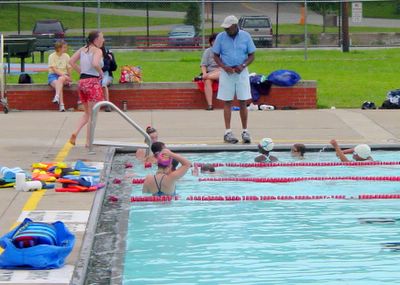Pride - The "Pride" Mentor Sweepstakes The “Pride” Mentor Sweepstakes (the “Sweepstakes”) is intended for viewing and participation only in the 50 United States and the District of Columbia (“U.S.”)
 Modern PRIDE guy(s).
Modern PRIDE guy(s).Photo was taken of Pitt's recent co-captians in Irvine, California, in August 2005 at Nationals. D (left) is a swimmer from Philly. J (right) is now doing his student teaching at CV and made his cuts to the Olympic Trials. He's been the summer coach at Green Tree.
Movie Trailer. The story of PDR (Philadelphia Department of Recreation), which created a number of top 16 swimmers, National and NCAA finalists, and Senior/Junior National qualifiers. One year the team won Junior Nationals. Brielle White, Michael Norment, Atiba Wade, Valerie Patterson, are all products of PDR and the program led by Coach Ellis. There was a really good article on this team in The New York Times Magazine back in the mid 1990s.

Hosea, Pittsburgh's version of Philly's PRIDE story. Coach H.H. coaches at the Kingsley Center and Carrick H.S. Here he is coaching in the summer at Highland Park Pool.



1 comment:
snip from USA Swimming . org site and an article on diversity in the coaches section:
Jim Ellis has been running an inner-city program for the last 30 years. A black swimmer from Pittsburgh, he started coaching while attending college near Philadelphia. His goal initially was to instill discipline in young, black males. He expanded that goal in 1980 when he was put in charge of a new indoor facility built by the city. Discipline would still underpin his club, Philadelphia Department of Recreation, but for more than a social purpose. Ellis wanted his swimmers to compete against the best in America. By the late 1980s he had succeeded to the point that Norment called from Long Island.
"Jim Ellis had all of these black kids swimming fast, and they were swimming different events, not just the 50 free," Norment says. “I swam with PDR for a summer and came back with an entirely different mind-set. My training level stepped up tenfold."
Norment's father, a college professor, took a job with Temple University and moved with his son to Philadelphia so he could swim with PDR year-round. Michael won the 200-yard breaststroke at the junior nationals two years later. Teammate Jason Webb, another African-American, won the 200-yard backstroke. PDR won the men's medley relay. All three victories came in record times. Ellis had done the improbable: black coach, black swimmers, inner-city team, junior national titles.
Ellis' success, however, came with an ironic twist. As PDR's stature grew, its composition lightened to the point that it is no longer just a black swim club, but rather a diverse, quality team that happens to have a large percentage of black swimmers. At a practice of his senior group this fall, only half the swimmers were black. What's more, none came from neighborhoods that surround PDR's indoor facility in northern Philadelphia. PDR might be an inner-city club, but it's mostly middle class with yearly dues for each of its swimmers up to $725.
"What I need is a 50-meter pool and enough money so that I can walk away from my (high school) teaching job," Ellis says. "Give me both and I will rock and roll."
A good facility, a well-paid coach, and blacks and Hispanics, as well as a sizeable number of whites, will be knocking down Ellis' door. It's the model for increasing diversity within competitive swimming. The only thing missing is the money to make it happen, money the American swimming community doesn't have.
"I don't want to look at this as a black-white issue, or a rich-poor issue, but as an issue of access, both to the facilities to train and the coaches to run the programs," says Wielgus. "But we can't get in the business of building facilities. We don't have the financial resources to even think about that."
Post a Comment